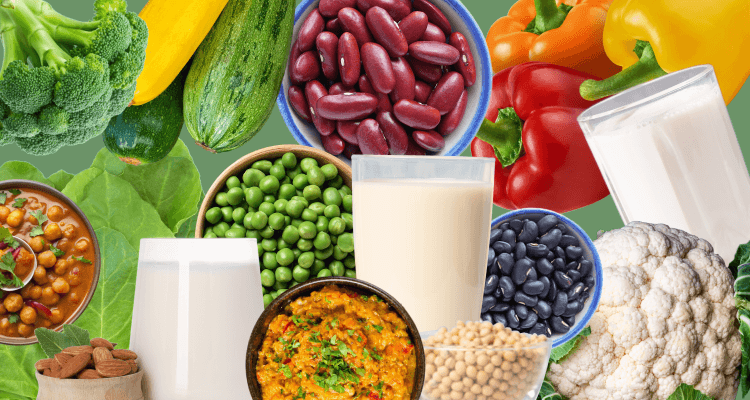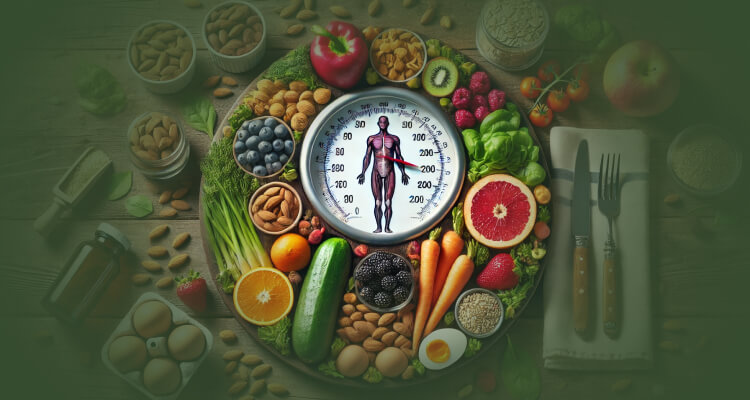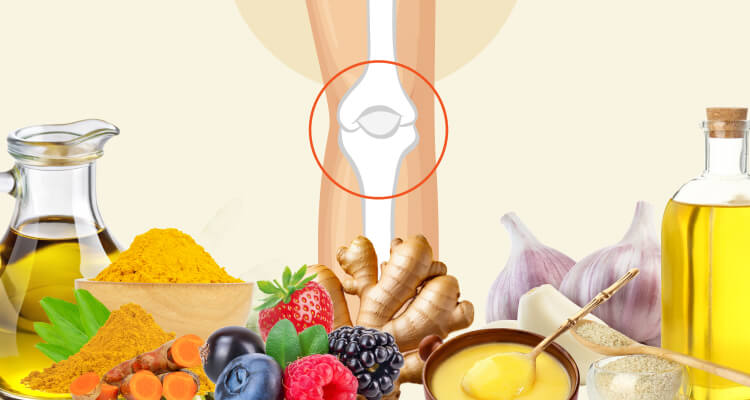In the world of Ayurveda, food is more than just fuel—it’s medicine. The way we eat directly influences our body’s vital energies (doshas) and can either heal or harm us.
When it comes to PCOS (Polycystic Ovary Syndrome), what you put on your plate has a profound impact on managing symptoms like hormonal imbalances, weight gain, and irregular cycles. PCOS is primarily linked to an imbalance in the Vata and Kapha doshas, both of which govern movement and cohesion in the body. When these doshas are out of balance, they can cause common PCOS symptoms like weight gain, sluggish metabolism, and digestive issues.
Ayurveda offers more than just herbs—it’s about embracing a whole lifestyle shift. The key lies in restoring balance to your doshas through mindful choices, especially in what you eat and what you avoid. We’ll dive into foods to help you balance your body and manage your hormonal health naturally.
Red Meat & Commercial Chicken
If you have PCOS or a hormonal imbalance, the type of meat you eat is something to think about carefully, especially red meat and commercially raised chicken.

- Aggravates Kapha: Red meat is heavy and dense, which can worsen Kapha imbalance, leading to weight gain, sluggish metabolism, and digestive issues—common with PCOS.
- Disrupts Hormones: Commercial chicken, especially broiler chicken, contains hormone-disrupting chemicals that can mess with your hormonal balance, causing irregular cycles and insulin resistance.
- Increases Sluggishness: Meat is considered tamasic in Ayurveda, meaning it can bring on lethargy, mental fog, and low energy—something women with PCOS often already experience.
A Healthier Way to Enjoy Meat

- Choose Organic & Free-Range like lean, grass-fed meats (white chicken, turkey, lamb). Cook with ghee for nourishment.
- Spice It Up with ginger, turmeric, black pepper, cumin, and fennel to support digestion.
- Cook Light by boiling, steaming, grilling, or using ghee instead of deep-frying.
- Eat in Moderation and enjoy meat during the day when digestion is at its peak.
Highly Processed Foods
Ayurveda and traditional health wisdom strongly discourage processed foods, especially for women managing PCOS. These foods disrupt digestion, trigger hormonal imbalances, and contribute to inflammation and toxin buildup.
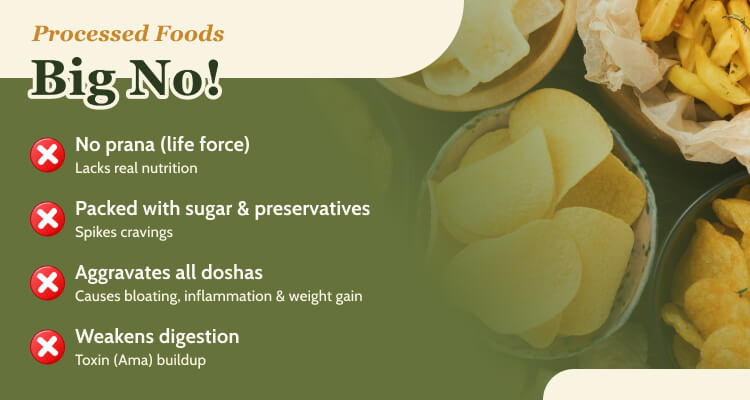
- Considered Stale & Unwholesome (“Paryushita”): Most processed foods sit in tins, packets, or boxes for long periods and can be correlated with the Ayurvedic term Paryushita—stale foods that have lost their prana (life force) and are considered unhealthy.
- Aggravates All Three Doshas
- Kapha: Packed with sugars, unhealthy fats, and preservatives, processed foods can negatively impact women’s health by contributing to hormonal imbalances, weight gain, heart disease, and reduced bone density.
- Vata: Artificial additives can cause bloating, digestive discomfort, and mood swings.
- Pitta: High salt and chemicals can overheat the body, triggering inflammation and skin issues like acne.
- Weakens Digestive Fire (Agni) & Increases Toxins (Ama): Processed foods harm your digestive fire (Agni), making it harder to break down food and clear out toxins (Ama), leading to cravings, slower metabolism, and worsening PCOS symptoms.
Simple Swaps for a Healthier You
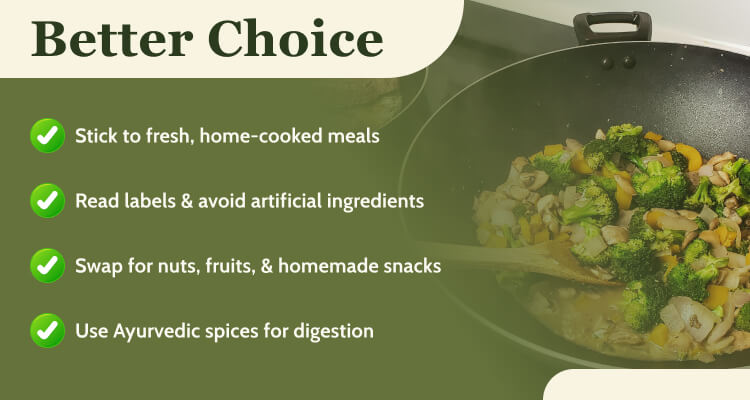
- Choose Whole and Fresh Foods by prioritizing home-cooked meals made from seasonal, nutrient-rich ingredients that nourish your body instead of depleting it.
- Read Labels Carefully and steer clear of foods with long ingredient lists, artificial additives, and refined sugars. Opt for natural, minimally processed options instead.
- Replace Processed Snacks with healthier alternatives like roasted nuts, homemade energy balls, fresh fruits, or makhana to cut out unnecessary artificial ingredients.
- Cook with spices such as cumin, coriander, turmeric, ginger, and fennel to support digestion, strengthen Agni, and prevent toxin buildup.
Sugary Treats & Beverages
Refined sugar and sugary beverages are major triggers for PCOS symptoms. Ayurveda warns against excessive sweet foods (Madhura Ahara), as they can disrupt hormones, cause weight gain, and aggravate Kapha dosha, which is already dominant in many women with PCOS.

- Worsens Insulin Resistance: PCOS is closely tied to insulin resistance, and consuming refined sugar can spike blood sugar levels, forcing the body to produce more insulin, leading to hormonal imbalances, weight gain, and difficulty managing PCOS symptoms.
- Aggravates Kapha Dosha: Too much sweetness increases Kapha, causing heaviness, sluggish digestion, and water retention. It slows metabolism and makes it harder for the body to process and eliminate excess hormones.
- Leads to Toxin Buildup: Sugary foods often have heavy and greasy qualities that slow digestion and create toxins (Ama). It can worsen inflammation, irregular cycles, and skin issues like acne—common struggles for women with PCOS.
- Throws Off Dietary Balance: Ayurveda emphasizes all six tastes—Sweet, Sour, Salty, Bitter, Astringent, and Pungent—for optimal health. Relying too much on sweets disturbs this balance, weakens digestion, and fuels cravings for unhealthy foods.
Smarter Ways to Satisfy Your Sweet Tooth

- Swap refined sugar for natural options like raw honey, jaggery, dates, or coconut sugar. They’re gentler on your blood sugar and come with added nutrients.
- Reach for naturally sweet foods like berries, pomegranates, and apples. They’re delicious, fiber-rich, and packed with antioxidants.
- Keep cravings in check by balancing flavors. Add bitter greens, astringent pulses, and pungent spices to your meals for a well-rounded diet.
- Ditch sugary drinks and sip on herbal teas instead. Cinnamon tea, fennel tea, and warm lemon water support digestion and help regulate blood sugar.
Refined Carbohydrates
Refined carbs like white flour and processed grains offer little nutrition and can disrupt digestion, insulin levels, and metabolism—making PCOS harder to manage.

- Stripped of Nutrients: Ayurveda classifies refined foods as Pishtanna—stripped of their natural goodness, making them harder to digest and metabolize.
- Spikes Blood Sugar & Insulin: With a high glycemic index, these carbs cause rapid sugar spikes, worsening insulin resistance and making weight and hormone balance more difficult.
- Lacks Fiber & Nutrients: Unlike whole grains, refined carbs lack fiber and key nutrients, leading to poor digestion, constant cravings, and unstable blood sugar.
- Slows Metabolism & Increases Kapha: Ayurveda warns that refined foods weaken tissue metabolism (Dhatu Agni) and increase Kapha, causing weight gain, sluggishness, and metabolic imbalances.
Smart Swaps for Steady Energy

- Go for Whole Grains like millet, quinoa, brown rice, and amaranth instead of refined flour to fuel your body with fiber and nutrients.
- Power Up with Fiber by adding veggies, legumes, flaxseeds, and chia seeds to keep digestion smooth and cravings in check.
- Consume white and black sesame seeds to regulate hormones, reduce menstrual pain, and improve blood circulation. Add them to salads, smoothies, baked goods, or yogurt for easy intake.
- Upgrade to chickpea or almond flour for a lighter, more nourishing alternative to white flour.
- Build Balanced Meals by pairing carbs with proteins, healthy fats, and fiber to keep blood sugar steady and energy levels high.
Fried Foods
As tempting as they are, fried foods can make PCOS symptoms worse. Their heavy, greasy nature (Ati Snigdha) weakens digestion, builds up toxins, and throws Kapha and Pitta out of balance—leading to weight gain, inflammation, and hormonal issues.

- Slows Metabolism and Adds Toxins: Fried foods are dense and oily, making digestion sluggish and promoting toxin buildup, which worsens PCOS symptoms.
- Triggers Inflammation and Breakouts: The excessive heat from fried foods fuels inflammation (Shotha), causing bloating, skin flare-ups, and digestive discomfort.
- Overwhelms Digestion and Hormones: Difficult to break down, fried foods weaken digestive fire (Agni), leading to sluggish digestion, hormonal imbalances, and low energy.
- Increases PCOS-Related Issues: Reheated oils and trans fats drive chronic inflammation, aggravating insulin resistance, irregular cycles, and skin problems.
Healthier, Tastier Alternatives

- Try grilling, sauteing, baking, or roasting instead of deep-frying for a crispy texture with way less oil.
- Choose Healthy Fats like coconut oil, ghee, or mustard oil—these are better for digestion than refined vegetable oils.
- Add Digestive Spices like ginger, cumin, turmeric, and black pepper to your meals to keep things light and help your metabolism.
- Opt for Lighter, Seasonal Foods with fresh, home-cooked meals—steamed veggies, whole grains, and legumes make digestion easier and help balance hormones.
Manage Your PCOS with Ayurveda
Managing PCOS starts with the right food. Ayurveda shows us how what we eat can truly impact our well-being. By cutting out foods that worsen PCOS—like refined sugars, fried foods, processed carbs, and heavy meats—you can reduce insulin resistance, inflammation, and hormonal imbalances.
But it’s not just about avoiding the wrong foods—it’s about fueling your body with fresh, whole, seasonal foods that support digestion and balance your doshas. Ayurveda promotes a diet full of fiber, healthy fats, and spices like turmeric, cumin, and ginger to keep your body in sync and manage PCOS naturally.
We’re here to support you on your journey to better health with Ayurveda, Yoga, diet, and lifestyle changes—all backed by solid research. Our goal is to make holistic health easy and personalized, using the latest tech to help you get the right plan for your unique needs.
Let’s work together to manage your PCOS, embrace balance, and live a vibrant, healthy life. We make holistic health simple, accessible, and truly transformative.


